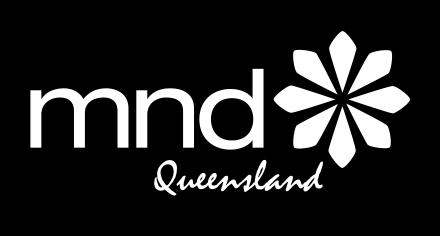WHATTOKNOWIFYOU’VE BEENDIAGNOSEDWITH MOTORNEURONEDISEASE
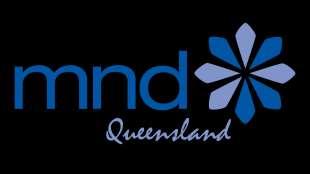

MND Queensland (also known as the Motor Neurone Disease Association of Queensland Inc. or MNDAQ) is a registered charitable not-for-profit organisation. We were formed in 1983 to provide support and services to people impacted by Motor Neurone Disease (MND). MND Queensland supports research efforts to find the cause of MND, effective treatments and ultimately a cure. We provide support and services to Queenslanders right across the State. We are a member-based organisation and strongly encourage everyone impacted by MND to join.
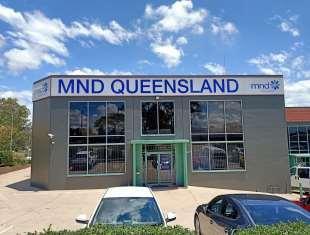
MND Queensland is part of a national alliance along with MND New South Wales, MND Victoria, MND South Australia, MND Western Australia and MND Tasmania. Together with MND Research Australia, these organisations make up the membership of MND Australia which is the national peak body for MND.
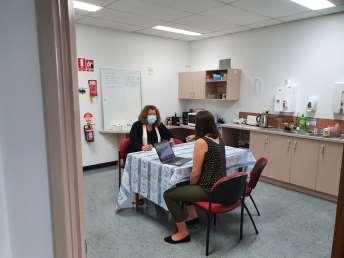
OUR VISION
A world free of the impact of MND.


OUR MISSION
Our mission is to help reduce the impact of Motor Neurone Disease on people living with MND, their families and carers. We do this by:
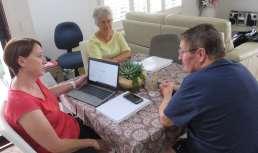
• Providing information, education and support;




• Raising awareness of MND and its impact; and
• Supporting efforts to find the cause and a cure for Motor Neurone Disease.
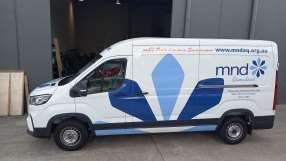
THE CORNFLOWER
The cornflower is the symbol of hope for people living with MND hope for finding the cause; hope for development of treatments, and for a cure. The cornflower represents positive hope for the future - a future without MND.
2
ABOUT MND QUEENSLAND
1. Front Cover - Photo by Sabine Lower from Pixabay
2. Inside Cover - About MND Queensland
3. Table of Contents & Foreword
4. MND Diagnosis
4. What is MND & How Did I Get It?
5. Familial Motor Neurone Disease
5. Cognitive Impacts


5. MND Clinics
11.

12. Back Cover - Photo by Sabine Lower from Pixabay
Testimonial from Rachell Rogers
When my beloved husband Phil was diagnosed with MND in 2019 our lives changed forever. We contacted MND Queensland for some advice and help, and within a couple of days they were on our door, and since then they have been right by our sides every step of the way.
MND Queensland’s team are the most compassionate and caring people we have ever met, helping us source equipment, healthcare professionals and so much more.
Team Rogers could not have done it without MND Queensland’s amazing support.
Forever grateful
FOREWORD BY DR ROBERT HENDERSON - VICE-PATRON
For those who may not know me, I’m Dr Robert Henderson, a neurologist who has worked with people with a Motor Neurone Disease (MND) diagnosis for 16 years. I’m also pleased to be a Vice-Patron of MND Queensland.


I respect the work of MND Queensland whose mission is to reduce the impact of an MND diagnosis on the individual, their families and carers. Their staff are knowledgeable and compassionate, and I hold their professional supports and services in high regard.
An MND diagnosis is a difficult time for most people and it doesn’t just impact on the individual, it also affects their family, friends and coworkers. There are often a range of overwhelming emotions and difficult questions that need to be answered. MND Queensland have developed this booklet to help give you answers to some of those questions.
People with an MND diagnosis are encouraged to access support services soon after their diagnosis. This is especially important in having someone to help navigate the complex worlds of NDIS or My Aged Care, and you and your family will also likely need emotional and practical supports from people who understand MND e.g. at the time of writing, you cannot access the NDIS if you have turned 65 or older. You may also consider activities like Voice Banking which are best done soon after a diagnosis while the voice is still strong enough.
Since they were established in 1983, MND Queensland has grown to provide a multidisciplinary service meaning that with your permission, their Occupational Therapists, Speech Pathologist, Equipment Hire Service and Support Coordinators can work together to achieve the best outcomes for you.
I hope that the information in this booklet helps to provide some of the information you’re looking for and helps ease the burden of an MND diagnosis. I encourage you to get in touch with MND Queensland if you have any queries or need their support services.
Regards
Dr Robert Henderson, MBBS (Hons), PhD, FRACP
December 2021
3
6. Multidisciplinary Care
7. Multidisciplinary Care Continued
Queensland
Getting Information
Living With MND
MND Medications
Carer Impacts/Needs/Risks
Financial Considerations
Funding Options
8. How MND
Can Support You 8.
9.
9.
9.
10.
10.
Research
Clinical Trials
&
11. Mobility Aids/AT/AAC & Cognitive Impacts
CONTENTS
If you or a loved one have received an MND diagnosis, you may be feeling lost, confused, scared and/or angry. Whilst each person reacts differently, it is likely that you are experiencing a range of confronting emotions.
MND is a complex disease that impacts each person differently, you are likely to have gone through a lengthy diagnosis process involving a variety of different tests and procedures to reach this point. At MND Queensland, we understand the whole process and the resulting diagnosis can be overwhelming. The purpose of this resource is to give you the key information you need in a clear and straightforward way so that you can access vital supports and services as soon as you are ready.
Within this booklet you will find information on MND and where to go if you want more detailed information. We can help you through this difficult time, advise you on the supports that are available and why they are important in helping you live with MND. MND Queensland offers support and services throughout Queensland and are determined to ensure that no Queenslander faces the disease alone.
If, rather than reading this booklet, you would be more comfortable speaking with a person who understands MND, please call 1800 777 175 where you can talk confidentially with an MND Advisor at MND Queensland. We encourage this because talking to someone who knows about MND lets you know there are people who understand, care and can support you through this journey.
Some of the things you can discuss with an MND Queensland advisor include:
• Answering any questions you or your family have in regards to your diagnosis
• Gaining support through talking about what you’re going through and how you’re feeling
• Providing information about how to best access services and supports


WHAT IS MOTOR NEURONE DISEASE & HOW DID I GET IT?
Motor Neurone Disease (MND) is a term used to describe a group of diseases that affect nerve cells called “motor neurones”. It is a progressive and degenerative neurological condition.
Motor Neurones carry messages from the brain to the muscles via the spinal cord. The messages allow people to make voluntary movements like walking, swallowing, talking and breathing. With MND the nerves become damaged and start to die, so muscles gradually get weaker and waste away. Without these Motor Neurones your movement, speech, swallow and breathing deteriorates. Currently, there is no cure for MND, and it is life limiting.
There are four main types of MND. They are:
• Amyotrophic Lateral Sclerosis (ALS)
• Progressive Muscular Atrophy (PMA)
• Progressive Bulbar Palsy (PBP)
• Primary Lateral Sclerosis (PLS)
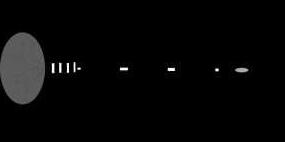
The area of your body you are experiencing symptoms determines which type of MND you have and how the disease may progress. You can learn more about the different types of MND on our website www.mndaq.org.au.
It is important to know that it is the management of symptoms that is most relevant to care rather than the diagnosed ‘type’.
In 90% of cases, MND is sporadic and despite ongoing global research, the cause remains unknown.

4
MND DIAGNOSIS
FAMILIAL MOTOR NEURONE DISEASE
Up to 10% of people who have been diagnosed with Motor Neurone Disease have what is known as familial MND which is where there is more than one affected person in a family. Familial MND is caused by a mutation in a gene. At the time of publication, the genes identified by research to cause inherited MND include: SOD1, TDP-43, FUS, C9ORF72 and NEK1.
People who have a genetic mutation have a 50/50 chance of passing the mutated gene onto their children. The chance of a person who inherits an MND-related genetic mutation developing MND during their lifetime is high but as yet uncertain and not all people with the mutated gene will develop MND.
An MND diagnosis will inevitably give rise to some very difficult feelings and emotions, and this can be even more complex for those that have familial MND. You may have concern for your family, children and your children’s children. There is genetic testing available if needed for your siblings or children, over the age of 18 years. Anyone considering this should seek specialised advice so you and your family are fully and correctly informed. It is recommended you talk to your GP, Neurologist or MND Queensland who can assist you through this journey and help you connect with a Genetic Counsellor where required.
COGNITIVE IMPACTS
It’s possible that you may experience cognitive changes throughout the progression of MND. Some changes can include reduced ability to plan, make decisions, organise information and problem solve. Each person’s experience with MND is different so cognitive impacts such as these can vary from person to person. A small proportion (5-15% will show more significant changes and be diagnosed with ‘motor neurone disease with frontotemporal dementia’ or MND/FTD. Please speak to your GP or Neurologist if you experience or your family notice any changes in cognition.
MND CLINICS
An MND Clinic is an outpatient clinic where people with MND, or who are in the diagnosis process, can get access to a range of medical and health professionals who specialise in MND. The aim of the clinics is to provide a coordinated multidisciplinary approach to your diagnosis. They facilitate patient reviews and the management of symptoms working with you through your MND journey.

The public clinics currently operating in Queensland are in the following locations:
• Royal Brisbane and Women’s Hospital
• Princess Alexandra Hospital
• Prince Charles Hospital
• Gold Coast University Hospital
• Sunshine Coast University Hospital


Accessing a clinic is highly recommended and your GP or Neurologist can refer you. Some of the clinics offer Telehealth to people who live outside of South-East Queensland so the service is accessible to those in the Regions. An MND Queensland Advisor can assist you with more information about your local clinic and put you in touch with the right people to access their services.

5
MULTIDISCIPLINARY CARE
Due to the complexity of MND, you will require the support of a multidisciplinary team of Medical and Allied Health Professionals as well as community services. Research supports that you will live better for longer with MND when health professionals have a coordinated approach to your care. It can be difficult to keep track of everyone’s role or know who to approach for support. To help you understand the various roles, the list below describes each of the types of support that may be needed.
MND Advisors
Your MND Advisors specialise in MND and will help you connect to the various services you need. They have an in-depth understanding of MND and work collaboratively with the other supports you need. MND Advisors offer ongoing information to families and loved ones as questions arise or your needs change. MND Advisors offer training to health professionals and service providers, working collaboratively to build their knowledge and understanding of MND. An MND Advisor will also help those eligible for the NDIS to gain access and with pre-planning ahead of the meeting with the NDIS planner.
Support Coordinator

A Support Coordinator will support you in implementing your NDIS plan. They assist people who are eligible for the NDIS who are allocated Support Coordination funding, to enact your NDIS plan and find suitable solutions with local services to meet your changing needs.
At MND Queensland these two roles, MND Advisor and Support Coordinator are combined to ensure the expertise and specialisation of the staff supporting you at all times.
Neurologist
Your Neurologist has expertise in disorders of the nervous system. They manage the tests you need for diagnosis and monitor disease progression and keep a close eye on your symptoms. Your Neurologist can discuss genetic testing and counselling and make the appropriate referral as needed.
General Practitioner (GP)
Your GP is usually your first point of medical contact. They will make the initial referral to a Neurologist and will communicate with the Neurologist, other health practitioners and community providers as needed.
Respiratory Specialist

A respiratory specialist specialises in breathing and lung difficulties. They provide information and advice about breathing and MND.
Nurse
The role of the Registered Nurse can include ongoing care and care coordination, often for people in their own homes where appropriate. Specialised MND nurses are effective in providing advice to help you manage your MND symptoms.
Occupational Therapist
An Occupational Therapist (OT) works with you so you can maintain mobility, function and independence. They also provide support in helping you engage in activities that are meaningful to you. OTs provide advice about home modifications, different ways of performing tasks and specialised equipment. They can also provide training to carers through support and education so your individual needs can be met.
Speech Pathologist
A Speech Pathologist (SP) can help you and your family maximize communication participation in meaningful activities of daily living to help improve/maintain independence and quality of life. Furthermore, a SP will work with you to adjust and adapt to any swallowing difficulties.
Dietitians
Dietitians provide dietary and nutritional advice to help individuals improve their health. This includes guidance about modified meals, hydration and timely nutritional support.
6
Physiotherapist

A physiotherapist helps you maintain physical activity and mobility and also assists with respiratory support. Physiotherapists can also show your family or carer how to safely help you move from one position to another.
Social Worker, Psychologist or Accredited Counsellor
A social worker, psychologist or accredited counsellor provides counselling on the psychological and emotional aspects of living with MND. These Allied Health Professionals contribute to helping you improve your quality of life. In addition, a social worker can provide information on community services that may assist you with accommodation, legal, financial and assist you to get your personal affairs in order.
Orthotist and/or Podiatrist
Orthotists can assess, prescribe, design, fit, monitor and provide therapy and education on artificial or mechanical aids, such as braces or splints to prevent or assist movement of weak or injured joints or muscles to help prolong function. A Podiatrist can assist with the treatment of feet and lower limbs assisting with mobility, pain relief in the foot, ankles and related structures of the leg.
Palliative Care Team
The palliative care team have a range of skills to support you and your family throughout the journey – not just final days as some people believe. They work together to improve your quality of life through meeting your psychological, social and cultural needs. Palliative care services also provide emotional support for people living with MND and their family, assisting with planning for your future care, particularly in regards to your personal wishes.
Support Worker/Personal Care Team
Support workers or personal carers provide practical support by helping you at home with all activities of daily living such as showering, dressing, preparing meals, eating, mobility and support you out in the community.
Aged Care Workers
Community aged care workers provide general household assistance, emotional support, care and companionship to people within their homes. They help people over the age of 65 achieve their goals and aid in enhancing positive health outcomes.
Testimonial from Deb and Joe
When I received a diagnosis of ALS from the first Neurologist I saw, he recommended that I see another neurologist to confirm the diagnosis.
Being the person I am, I sought assistance immediately and using Google, I decided on MND Queensland as it was as local as I could find, living in Central Queensland.
I used the contact link on their website and shortly after I received a call from Sandy who explained the process of accessing the NDIS and after she offered, I gave my consent for her to be my NDIS Support Coordinator.
Since then, my wonderful carer/husband and I have received frequent assistance and support including equipment hire, accessing and managing the services from all of my allied health providers as well as well as monthly review appointments with Sandy by Zoom or telephone.
Even though we are situated so far from the head office, we know that Sandy understands every person with MND has different problems and needs and we feel confident she knows us well enough and advocates for us both professionally and personally.
MND Queensland has also filled the gaps with their own Occupational Therapists when we couldn’t source one immediately locally.
Their website is another resource my family and I access frequently to view their informative webinars and I know our sons have been helped by calling MND Queensland for information or support.
When you’re trying to live with something as big as ALS, there isn’t much in reserve to navigate and organise the services available.
This is where MND Queensland allows us to focus on making the most of our present moment living, knowing and trusting that we are supported through the health system so efficiently.
7
MND Queensland’s purpose is to support you and your family throughout your MND journey and disease progression. We can assist you to better understand your MND, know what support is available, access funding for services and manage symptoms through accessing the right specialised assistance.
Membership to MND Queensland is free for those with an MND diagnosis. You can join by completing a membership application via our website www.mndaq.org.au or by contacting us on 1800 777 175. We also encourage other family members and friends to join ($25 annual fee) as they too are an important part of the MND Community.
MND Queensland is the only direct provider of specialist MND services in Queensland. We offer the following supports:
• Information and Advice about MND and support services
• Occupational Therapy
• Speech Pathology
• Low cost Equipment/Assistive Technology Hire


• Advice on Funding e.g. My Aged Care and the National Disability Insurance Scheme (NDIS)
• NDIS pre-planning
• NDIS Support Coordination
• Life Stories Program
• Voice Banking Clinic
• Education to Community Service Providers, aged care facilities and Allied Health professionals
• Support Groups – Connection for people living with MND and their loved ones across Queensland
• Webinars with specialist guest speakers
• Carer Support
• Community events to connect people and families with MND

By choosing MND Queensland to provide your support services, you are not only accessing expert MND supports, but you are also ensuring that the service will continue to benefit future generations of people impacted by MND.
To find out how we might assist you, please contact us on 1800 777 175 or email supportservices@mndaq.org.au.
GETTING INFORMATION
When receiving a diagnosis that is as life changing as MND, researching the disease online is a common response and it can be tempting to read everything you find. However, not all information on the internet is accurate and so it is important to choose and focus on reliable sources.
MND Queensland, the other State MND Associations and MND Australia have worked collaboratively to develop a single source of information that is accurate, up-to-date and reliable. We would therefore recommend that you use www.mndaustralia.org.au/mnd-connect as the main source of information. All of the resources you will find on the website can be provided by MND Queensland as a hardcopy if required.
You can call the MND Infoline on 1800 777 175 where you will find someone to talk to and answer any questions you might have. This line operates from 9am to 4:30pm Monday to Friday.

8
HOW MND QUEENSLAND CAN SUPPORT YOU
It’s important to understand that every person’s experience with MND is different but there are various strategies you can use to help manage the day-to-day reality of living with MND. If you’ve been diagnosed with MND, MND Queensland is here to support you and your loved ones in managing its impact and to help you achieve the best possible quality of life from diagnosis onwards.
Finding ways to better deal with pain, discomfort, mobility issues, and mouth care are some challenges of living with MND on a day-to-day basis. As the rate and pattern of progression of MND varies significantly from person to person; it’s important to seek advice from health professionals that have knowledge of MND so they understand your needs, now and into the future.
MND MEDICATIONS
In Australia, Riluzole is sometimes prescribed for people with MND. This medication is a treatment offered for Amyotrophic Lateral Sclerosis (ALS) and Progressive Bulbar Palsy (PBP). Research supports Riluzole may extend the average survival by 6 to 19 months by slowing the progression of MND.
Riluzole is available on the Pharmaceutical Benefits Scheme for people who meet the eligibility criteria. This medication can be prescribed, initially, by a Neurologist. People who start taking Riluzole soon after diagnosis show the greatest benefits. Please seek guidance from your Neurologist on the suitability of this treatment.
Anti-anxiety, pain relief and other medications may also be used as part of managing MND symptoms. All medications and therapies require careful management and should always be used with support from your healthcare team.
Scientists around the world continue to conduct research to learn about MND and to develop medications that may slow, and one day, cure the disease.
For more information about medication management, contact your GP or Neurologist.
CARER IMPACTS/NEEDS/RISKS
Caring for someone with a life-shortening illness such as MND can be an extremely difficult and emotional experience. We recognise that providing care for a loved one living with MND is bound to be psychologically and physically challenging. However, your worries can be minimised as there are ways that you can look after yourself, and your loved ones, when dealing with complex situations. For many carers, looking after a loved one is ‘just what you do’ and most carers highlight the privilege of being able to care for their loved ones. MND Queensland can provide information and services to support people living with MND, their family and friends.
Over time, as the person living with MND’s symptoms progress, so does the workload carers carry. Becoming a carer may lead to the following:
• Changes in practical activities in everyday life (e.g., helping with mobility, meals and other needs)
• Figuring out quickly how to care for someone towards the end of life
• A need to deal with many different emotions, feelings and responsibilities at the same time



• Financial difficulties
For more information on the supports and services available specifically for carers, call MND Queensland on 1800 777 175.
9
LIVING WITH MND
An MND diagnosis can also lead to concerns about finances.

Those diagnosed with MND under the age of 65, may be eligible for a Disability Support Pension (DSP) if you meet both non-medical and medical rules. Non-medical rules assess how your condition affects you and medical rules includes things like your age, residence status and income. You can still access services under the NDIS if you decide to claim DSP. You may also benefit from talking with a qualified advisor about managing superannuation, insurance, daily or regular payments and other financial matters.
Informal carers, such as family members or friends, may also be entitled to government payments in the form of a Carer Allowance or Carer Payment.
For more information about DSP, or financial supports for carers, please contact MND Queensland or get in touch with Centrelink directly to assess your eligibility.
FUNDING OPTIONS
Living with MND will likely mean that you need access to a range of supports and mobility aids. These can be expensive so it is important to start the process for accessing appropriate funding as soon as possible after diagnosis. Your entitlement to funding depends on a range of factors and criteria, your MND Advisor can help you to understand what is available to you and assist you to access the appropriate funding.
National Disability Insurance Scheme (NDIS)


The NDIS is available to Australian citizens and permanent residents under the age of 65 who have a permanent or significant disability. It provides individualised funding to be used to meet needs that arise because of a disability such as Allied Health therapies, personal care, mobility aids and home modifications. The scheme is not means tested. Access must be requested before turning 65. NDIS will provide funding for as long as supports are needed. More information on the NDIS can be provided by your MND Advisor or via the website www.ndis.gov.au.
My Aged Care
My Aged Care is the funding option for people over the age of 65. Supports can be accessed through the Commonwealth Home Support Program (CHSP) or a Home Care Package (HCP). CHSP offers basic supports across a number of different areas and each requires a small co-contribution but services can generally be put in place quite quickly.
There are four levels of HCP’s and these are designed to allow flexibility in the use of the funding. An ACAT assessment is required to determine suitability for a HCP and identify which level a person requires. Home Care packages are means tested and people who are partial or self-funded retirees will be required to make a financial contribution for service offered. It is important to start the process as soon as possible after diagnosis as there can be lengthy waits for a HCP, particularly higher level ones.
More information on My Aged Care supports can be provided by your MND Advisor or via the website www.myagedcare.gov.au
10
FINANCIAL
CONSIDERATIONS
Motor Neurone Disease Research Australia (MNDRA) is a national organisation, established in 1984 to promote medical and scientific research into MND.
The effort is underway to develop new and effective treatments for MND. Part of this research involves clinical trials which test new treatments and interventions to work towards finding a cure for MND. These trials test biological products, vaccines and other medical treatments.
If you or anyone you know with MND is interested in participating in the ever-emerging clinical trials across Australia, you will first need to speak with your Neurologist to assess your eligibility.
If you have any specific questions about MND research or clinical trials, contact MND Queensland by phoning 1800 777 175.

MOBILITY AIDS/AT/AAC
We can provide some help and assistance to make living with MND easier for you. You may find it harder to feed yourself, get dressed, perform daily routines or transfer your body weight (e.g., from bed to chair). MND Queensland can advise on GP’s and other health professionals that can help prescribe a range of assistive technology (AT). AT is physical supports that enable people living with MND to enjoy the best possible quality of life.
MND Queensland has an equipment loan service which provides helpful communication, mobility and everyday living aids for you to use. The purpose of this is to keep people living with MND independent, included, safe and mobile. The type of assistive technology you may use depends on the rate of MND progression, personal situations and types of physical changes you experience. An appropriate health professional will help you determine what AT options will work best for you and your lifestyle.
We understand that in many instances, equipment is required urgently so we keep all of our aids on site and our staff will deliver directly to those in South-East Queensland meaning that we can distribute items quickly. Hiring of equipment to our clients across the remainder of the state is also regularly handled through external couriers for delivery.
Some examples of AT that we offer include:
• Adjustable electric beds
• Shower Chairs or Shower Commodes
• Sit to stand reclining chairs
• Wheelchairs manual or Powered Wheelchairs


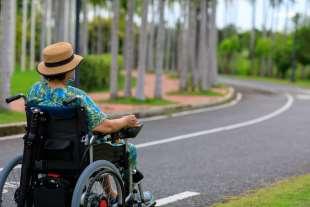
• Transfer aids
• Cough Assists and Suction Machines
• Hand grips and pressure reducing cushions
Additionally, Augmentative and Alternative Communication (AAC) aids are available for MND clients. Communication aids will help ensure you can continue to be able to express your opinion and preferences over time. This may be with use of a communication board, app or higher level technology. If you would like more information about mobility aids, AT and AAC contact the MND hotline by calling 1800 777 175 and we’ll be happy to answer any of your questions.
11
RESEARCH & CLINICAL TRIALS
Testimonial from Melita, the wife of a person with MND
After the diagnosis, we went through an enormous upheaval from finding somewhere to live to learning about the disease and trying to find out what was next. All this happened at the beginning of the pandemic. After many days searching the internet I was really none the wiser in what to expect. As always happens when you use ‘search’, I was suddenly inundated with sites about MND. Among these was a site about MND Queensland. I read through the information and decided I would ring to find out more. That was the best decision I have ever made. From the first conversation with Sandra we were put at ease. Someone who could explain what was what. She told us about the amazing services which they offered and what to expect from them. For the first time in three months I was beginning to understand that there was help for us. From services offered to equipment hire, to answers to questions nobody else could help with. But most of all it was the kind words and understanding of the things we needed to know but did not know to ask. Every step of this journey we are on they have been there with us. I will be forever grateful for all they have done for us and continue to do. Words cannot express what I feel for them all.






















